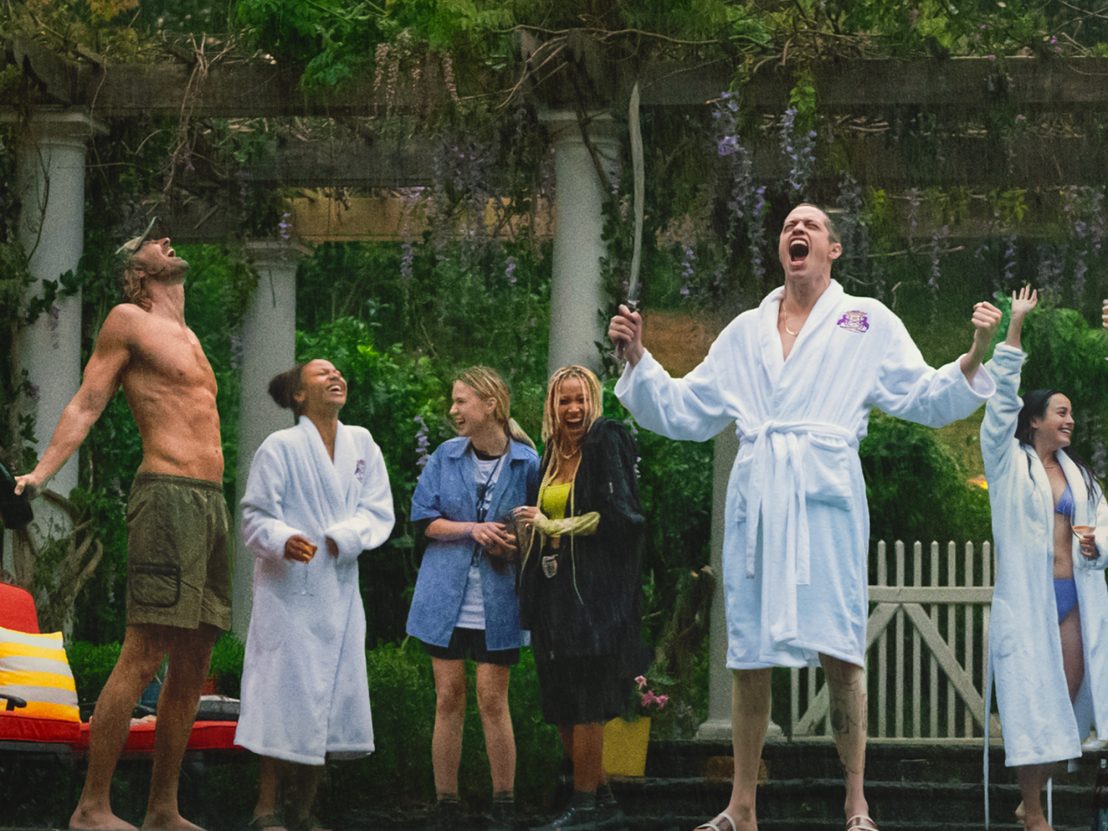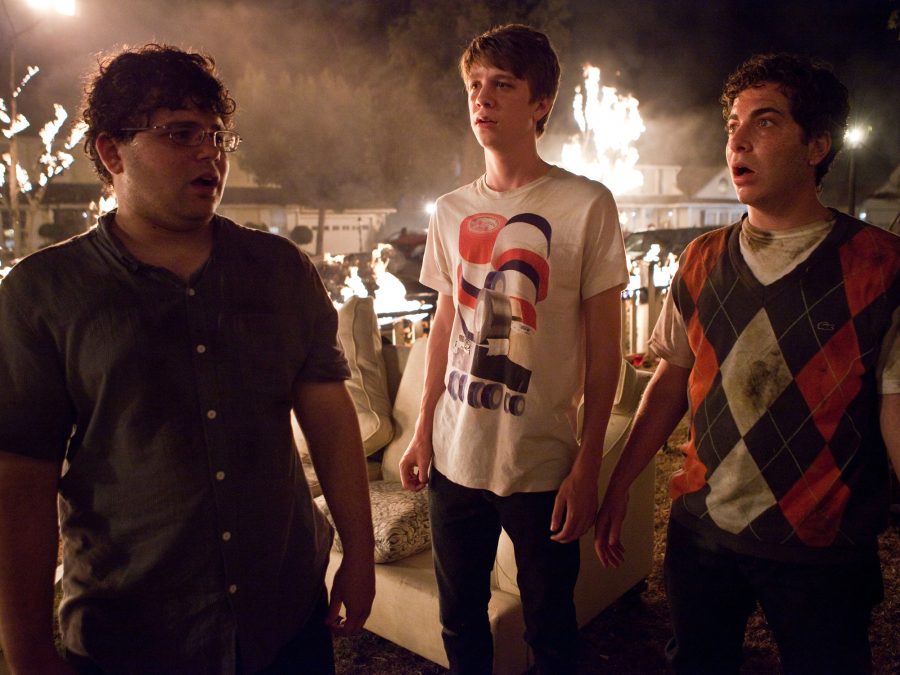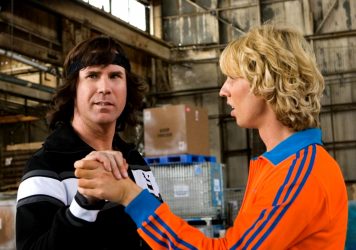
A24’s latest bloodfest Bodies Bodies Bodies is a sardonic riff on The House Party – the only trope in Hollywood that has its own smell. Following the tang of teen spirit to an upstate New York mansion to ride out a hurricane, Sophie (Amandla Stenberg) reassures her new girlfriend Bee (Maria Bakalova) that the friends they are about to meet are “not as nihilistic as they look online”. Spoiler alert: they are.
The teen movies I grew up on taught me not to give a fuck – Bodies Bodies Bodies makes it clear that Gen Z doesn’t need any coaching. A hurricane would’ve seemed cataclysmic cutting through Gurinder Chadha’s Angus, Thongs and Perfect Snogging; here, it’s barely pathetic fallacy. After the titular card game goes awry, Euphoria meets Agatha Christie and the vicious ensemble of partygoers make the Girls of Lena Dunham’s Girls seem self-aware. Baying for the body count, it’s the best satirical (and literal) skewering of Gen Z to date.
Nonetheless, part of me will always be a Stifler – I mean stickler – for the early noughties house party. The Sum 41-fuelled MTV-of-it-all in 2001’s American Pie 2, or Jake Gyllenhaal’s weird time-trail goopy moment in Donnie Darko of the same year, one that also gave us the genre send-up Not Another Teen Movie. For better or (almost definitely) for worse, these films shaped my concept of house parties during those formative, formless years when my hormones were haywire and weekends involved persuading a kindly stranger outside the local Tesco Metro to buy us some Fosters. We would’ve taken Superbad’s fake McLovin ID over my mate’s brother’s out-of-date driving license any day of the week.
This was the era of The Girl Next Door (2004), The Hot Chick (2002) – cinema as a pervy set of binoculars for the Male Gaze. Still this was an improvement on the teen movies of the 80s. Weird Science (1985) skips the pick-up artistry altogether and instead sees a ragtag group of nerds Frankenstein themselves up the ‘perfect’ (read: busty) woman. A mutant biker gang invades their house party later in the film and sends the boys running, but they’re not nearly as brutalised as a 2020s audience might like them to be. Barely even maimed, in fact.
Instead, the worst downfall a straight man-boy can expect in an ‘80s teen movie is a spot of shame. The awkwardness in 1985’s Teen Wolf comes courtesy of a game of Seven Minutes in Heaven and a full moon. Teenagehood is, after all, a unique – and uniquely terrifying – time of new social codes and bodily transformation, be it underarm hair or full werewolf.
With the emotional bar set at werewolves, kegs, and motorboating, praise be to debut writer and director Paul Bruckman, whose slick teen sex comedy Risky Business (1983) has more nuance than the rest of the era’s offerings combined. Tom Cruise, in his breakout role, plays a spoiled yuppie who transforms his house into an actual brothel for the night while interviewing for an Ivy League – but you don’t even hate him. Rather, Bruckman borrows lyrical sleights of hand from European arthouse cinema, knows when to leave things unsaid and relies on Cruise’s sheer charisma to keep the character on the right side of loathsome.
From lived experience, an amped-up dude does tend to be the scariest thing that can befall a decent party. For that reason, Delta Psi’s ‘Robert De Niro’ themed social in Bad Neighbours (2014) is more nightmarish than anything supernatural. Still, I’d rather be ignoring fifty frat bros mumbling ‘You talkin’ to me?’ than in a cramped kitchen with two drunken men beating the shit out of a chair, as in Harmony Korine’s experimental drama Gummo (1997).
Gummo’s raw and ropey energy is something that Nima Nourizadeh’s Project X (2012) strove for but couldn’t reach. Produced by Todd Phillips – of The Hangover Trilogy and Joker fame – the found-footage teen is a disaster teen party comedy without a sense of humour. Its Blair Witch-inspired attempt at ‘authenticity’ through found-footage techniques barely conceals its grim, tiresome, Hunter Moore-ish pursuit of sex.

Time to grow up, then. Trey Shultz’s Waves (2019) is the most acutely observed recent depiction of unbridled testosterone. Arriving the same year as Sam Levinson’s teen drama Euphoria, and sharing a star in Alexa Demie, the aftershocks of that scene in Waves ripple across the rest of its runtime and are emblematic of a shift in how parties are depicted on our screens.
Waves is all about the burden of living up to an unreachable societal standard, for which house parties play the role of a Large Hadron Collider. This has been dramatised before, of course, and Mean Girls (2004) is prime: tell me you don’t wake up in a cold sweat some nights remembering Cady (Lindsay Lohan) turning up to that Halloween Party in a bridal gown and buck teeth only to discover her frenemies, the Plastics, have dressed sexy.
But cinephiles! Good news is there are so many more ways – more nuanced, distressing, disturbing ways – that you can fall short of the expectations of your peers beyond wearing the wrong costume, and therefore an abundance of party disasters still to be written. You could be arrogant. Needy. Greedy. Aggressive. Passive-aggressive. Obsessive. What’s more, social media is only raising our perceived ideals so failure is all but guaranteed – plus you must seek peer approval at an even earlier age. Fourteen-year-old Kayla’s (Elsie Fisher) long, timid walk from the guest bathroom to the pool party in Eighth Grade (2018) is one of the most suspenseful in all of cinema for the weight of all that imagined, silent judgement beaming her way.
While social media proves a temporary solace for Kayla, we all know the cure is also poison. Bodies Bodies Bodies gets this so right. The first generation to be exposed to the internet from earliest youth, the film calls out Gen Z for their warped way of seeing the world. While our desire for approval shifts from our parents to our peers during puberty, it doesn’t simply stop at nineteen, and social media giants know how to manipulate it.
So be warned non-Gen-Z-ers who feel like sticking the knife in too – doing so would just prove that social media is the most horrifying thing to ever happen to house parties: it colours our every thought and action, every cutting Tweet, every TikTok-ready takedown. As Bodies Bodies Bodies proves, it has made keyboard slashers of us all.
Published 31 Aug 2022

Amandla Stenberg, Lee Pace, Maria Bakalova, Pete Davidson, and Rachel Sennott star in the Gen-Z-fluent horror film.

Ten years ago, the likes of Blades of Glory and Hot Rod signalled the end of the Frat Pack era.